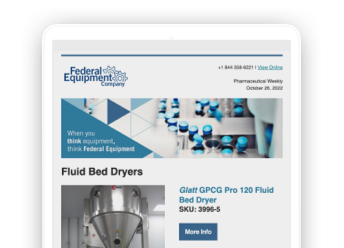Used Bioreactors & Fermenters
Federal Equipment Company sells fermenters and bioreactors used for biochemically active reactions. These types of vessels are used to cultivate cells or microorganisms under controlled conditions and are typically made from stainless steel or glass. They are useful for producing biopharmaceuticals like drugs, vaccines, antibodies, and other therapeutic proteins. They also can be used for food and beverage production, and chemical production. Our used inventory offers a variety of fermenters and bioreactors such as bench-top models for research and development, pilot and scale-up fermentation systems, or large-scale systems for commercial production.
Browse our selection below and request a quote for more information regarding our Used Industrial Fermenters and Bioreactors.
Bioreactor and Fermenter Manufacturers
We offer used fermenters and bioreactors made by top manufacturers like B. Braun, Bioengineering, GE Healthcare Life Sciences, Sartorious, Precision, New Brunswick, Pierre Guerin, and many others.
Bioreactor Types
Single-use Stirred Tank Bioreactors
Single-use stirred tank bioreactors are designed to be disposable after a single run, eliminating the need for cleaning and sterilization between batches. They have an impeller for mixing, ensuring even distribution of nutrients and oxygen, and are great for various cell types, from bacteria to mammalian cells.
Continuous Stirred Tank Bioreactors
Bioreactors designed for extended, stable operation are called continuous bioreactors, or continuous culture bioreactors. These systems differ from batch and fed-batch bioreactors, which involve harvesting the entire culture at the end of a production cycle. Instead, continuous bioreactors maintain a steady state by constantly replenishing the culture with fresh medium while simultaneously removing spent medium and cells.
Airlift Bioreactors
These use air bubbles to both mix and provide oxygen. They have a simpler design than stirred tanks and are often used for microorganisms that are sensitive to mechanical stress.
Packed Bed Bioreactors
These have a solid support material (like beads or ceramic) packed within the reactor. Microorganisms grow on this support. They are often used for continuous processes and for microorganisms that need to adhere to a surface.
Fluidized Bed Bioreactors
Similar to packed beds, however, the solid support is suspended in a liquid medium, creating a fluidized bed. This improves mixing and mass transfer.
Browse our selection below and request a quote for more information regarding our Used Bioreactors & Fermenters.
Can't Find What You're Looking For?
If you're uncertain about your requirements or can't find the specific equipment you're seeking, let us know your needs and we'll assist you.
Frequently asked questions about Used Bioreactors & Fermenters
Frequently Asked Questions About Used Bioreactors & Fermenters For Sale
What is a bioreactor used for?
Bioreactors are vessels used to cultivate cells or microorganisms under controlled conditions. They're essential tools in biotechnology, used for a wide range of applications. These include producing biopharmaceuticals like drugs and vaccines, manufacturing food and beverages like yogurt and beer, creating industrial chemicals and biofuels, and even treating wastewater. Essentially, bioreactors provide the optimal environment for biological processes to occur efficiently.
What are the 3 most common types of bioreactors?
While there are many variations, three of the most common bioreactor types are stirred tank, airlift, and packed bed. Stirred tank bioreactors use an impeller for mixing, making them versatile for various cell types. Airlift bioreactors utilize air bubbles for both mixing and oxygen supply, simplifying the design. Packed bed bioreactors feature cells growing on a solid support material, often used for cells requiring adherence.
What is the lifespan of a bioreactor?
The lifespan of a bioreactor depends heavily on its construction, maintenance, and usage. Stainless steel bioreactors, with proper care, can last for many years, even decades. Glass bioreactors, while more fragile, can also have a long lifespan. Single-use bioreactors, by design, are used for a single batch and then disposed of, so their lifespan is limited to that one process. Regular maintenance, including cleaning, sterilization, and part replacement, is crucial for maximizing any bioreactor's lifespan.
Why are single-use bioreactors better?
Single-use bioreactors offer several advantages, primarily convenience and reduced turnaround time. Since the vessels are disposable, there's no need for cleaning or sterilization between batches, saving significant time and resources. This also minimizes the risk of cross-contamination. Single-use systems are particularly beneficial for processes where sterility is paramount or when dealing with multiple products.
Which type of bioreactor is more efficient?
There's no single "most efficient" bioreactor type. Efficiency depends entirely on the specific application. Factors like the cell type, the desired product, the scale of the process, and cost considerations all play a role. For example, a stirred tank might be efficient for one process, while a packed bed might be better suited for another. Careful evaluation and selection are crucial for optimizing efficiency in any bioprocess.
